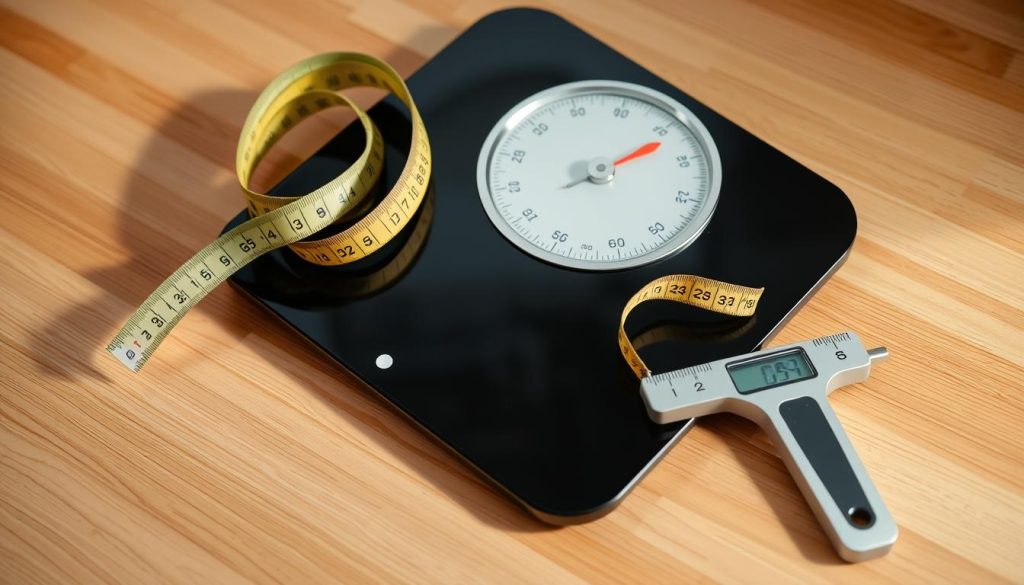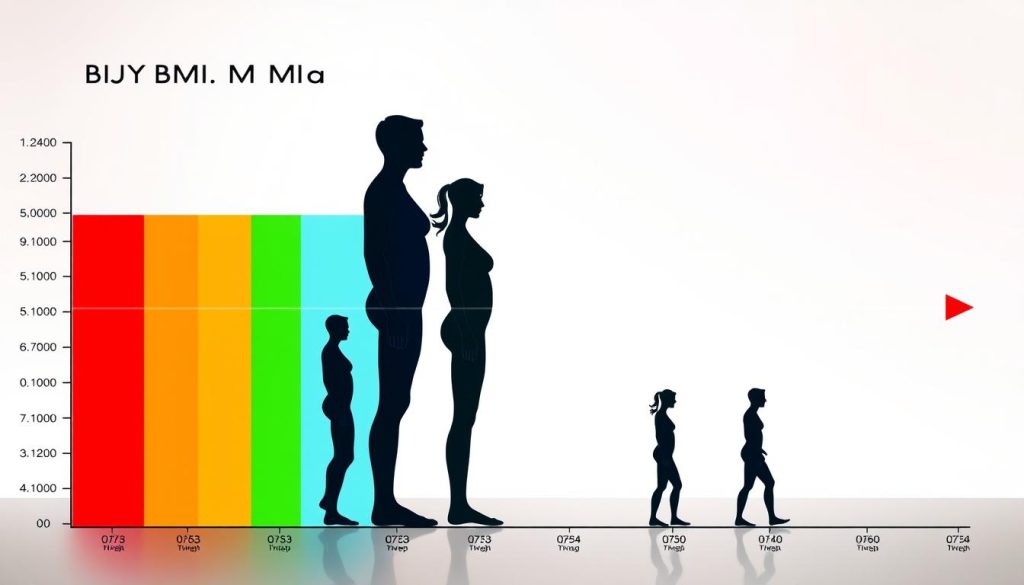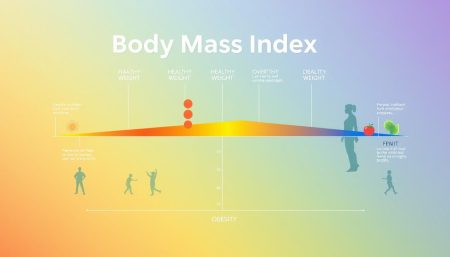Understanding health metrics is key to a healthy lifestyle. The Body Mass Index (BMI) is a helpful tool for spotting and avoiding health risks linked to weight. It combines simple math with the complex world of health, making BMI a crucial tool for weight management and obesity prevention.
This guide will show you why knowing how to measure BMI is important. It helps you use this metric to improve your health.
Key Takeaways
- BMI is a critical metric for monitoring weight and overall health.
- Knowing how to measure BMI empowers individuals on their health journey.
- It aids in the early detection and prevention of weight-related health issues.
- Understanding BMI is beneficial for personal weight management strategies.
- Despite its value, BMI is not exhaustive and should be contextualized with other health indicators.
What is Body Mass Index (BMI)?
Body Mass Index (BMI) is a way to guess how much body fat someone has. It uses weight and height. Doctors and fitness experts use it to check health and talk about weight risks.
It’s key for keeping a healthy weight and staying well.
Definition of BMI
BMI is found by dividing weight in kilograms by height in meters squared. It’s a simple way to sort people into weight groups. Doctors use it to talk about weight risks with patients.
Importance of BMI
BMI helps health experts understand big health issues. It guides health plans and fitness tracking. It also helps spot health problems in certain groups.
Knowing your BMI can push you to make healthier choices. This includes better diet and exercise.
Limitations of BMI
BMI has its downsides. It doesn’t tell the difference between muscle and fat. This can be wrong for athletes with lots of muscle.
Also, BMI can mean different things for different ethnic groups. The same BMI can mean different health risks for different people.
| BMI Category | BMI Range (kg/m²) |
|---|---|
| Underweight | |
| Normal weight | 18.5 – 24.9 |
| Overweight | 25 – 29.9 |
| Obesity | 30 or higher |
How is BMI Calculated?
Understanding Body Mass Index (BMI) is key for anyone watching their health metrics and aiming for weight loss goals. It’s a simple yet important way to see your body fat percentage.
Formula for BMI
BMI uses a formula that compares your weight to your height. It’s your weight in kilograms divided by your height in meters squared (kg/m2). You can find more details on this from Cleveland Clinic’s guide.
Conversion Factors
If you use imperial units, you need conversion factors for an accurate BMI. First, change your height from inches to meters (1 inch = 0.0254 meters). Then, change your weight from pounds to kilograms (1 pound = 0.453592 kilograms). These steps help ensure your BMI reflects your body density accurately.
Example Calculation
Here’s an example to show how BMI is calculated and its role in weight loss goals. For an adult who weighs 150 pounds and is 5 feet 6 inches tall:
- Change the weight from pounds to kilograms: 150 lb × 0.453592 = 68 kg.
- Change the height from inches to meters: (5 feet × 12 inches) + 6 inches = 66 inches; 66 inches × 0.0254 = 1.68 meters.
- Calculate BMI: 68 kg / (1.68 m × 1.68 m) = 24.1 kg/m2.
This BMI is in the normal weight range. It’s a good sign for those tracking their body fat percentage and aiming for healthy health metrics.
| BMI Category | Range |
|---|---|
| Underweight | 2 |
| Normal weight | 18.5 – 24.9 kg/m2 |
| Overweight | 25 – 29.9 kg/m2 |
| Obesity | >30 kg/m2 |
Tools Needed to Measure BMI
Measuring Body Mass Index (BMI) is key to knowing your health and fitness level. To get accurate health data, you need specific tools. These tools help collect the right information for tracking fitness and body fat.
Learning how to use these tools well can help you live a healthier life.
Measuring Tape
A flexible measuring tape is a must for measuring height. It gives a precise reading from head to toe. This is better than using a rigid ruler.
Weighing Scale
A good weighing scale is vital for tracking your weight. Digital scales are especially accurate. They show even small weight changes, helping you track your fitness closely.
BMI Calculator
Once you have your height and weight, use a BMI calculator or chart. It uses these numbers to calculate your BMI. Then, it sorts you into health categories like underweight, normal, overweight, or obese.

| Tool | Usage | Importance |
|---|---|---|
| Measuring Tape | Height measurement | Ensures accurate measurement of height for BMI calculation |
| Weighing Scale | Body weight assessment | Provides precise body weight data essential for health tracking |
| BMI Calculator | Calculation of BMI | Turns height and weight data into actionable health information |
Steps to Measure Your Height Accurately
Measuring your height accurately is key for calculating Body Mass Index (BMI). It helps you understand your ideal body weight and aids in weight management. Here are the steps to get precise measurements for a healthy weight range.
Finding the Right Wall
First, pick a wall that is flat and free from obstacles. Take down any artwork or items hanging nearby. A smooth surface is essential for accurate measurements. This step is vital for a precise measure, helping you reach your health goals.
Positioning Your Head and Feet
Stand correctly for an accurate reading. Place your back against the wall, heels on the floor, and look straight ahead. Your body should align with the wall from head to toe. This stance helps in finding your maximum height, aiding in health management and ideal body weight.
Recording Your Height
Mark the top of your head with a pencil or marker. Then, measure from the floor to the mark with a metal tape measure. Record this carefully. It’s important for BMI and tracking your healthy weight range.
Learning these steps helps you monitor your health and make informed weight management decisions. Accurate measurements are crucial for a healthy lifestyle.
### Table: Height Recording Tips
| Aspect | Tip | Reason |
|---|---|---|
| Wall Selection | Choose a flat, unobstructed wall | Ensures the accuracy of the base measurement |
| Body Position | Heels, back, and head against the wall | Maintains alignment for an accurate vertical measure |
| Recording Method | Use a stiff metal tape measure | Prevents sagging and bending, enhancing measurement precision |
By following these guidelines, you can accurately track your height. This helps you make lifestyle changes for a healthy weight range.
Steps to Measure Your Weight Accurately
Getting your weight right is key for tracking your health. It helps you reach your weight loss goals and stay fit. Knowing how to measure your weight correctly is important for tracking your progress well.
Preparing to Weigh Yourself
Consistency is important when you weigh yourself. Pick a time each day, like morning before breakfast. This reduces the effect of food and water on your weight.
Make sure your scale is on a hard, flat surface. This avoids any mistakes in your weight reading.
Best Practices for Accurate Measurements
To help your fitness and health, follow the best ways to measure your weight. It’s not just about stepping on a scale. You need to know what affects your weight and how to handle it.
| Factor | Recommendation | Impact |
|---|---|---|
| Clothing | Weigh without heavy clothing | Removes variability due to clothing weight |
| Time of Day | Weigh first thing in the morning | Consistent hydration and food levels |
| Scale Calibration | Check scale calibration regularly | Ensures accuracy over time |
| Posture | Stand still, with weight evenly distributed | Prevents fluctuation during measurements |
By following these steps, you can get accurate weight readings. This helps you track your fitness and health better. Having consistent and accurate weight data is a great way to manage your health and reach your weight loss goals.
Interpreting Your BMI Results
Understanding your Body Mass Index (BMI) is key to knowing your health status. It shows if you’re in the healthy weight range. This part explains the BMI categories, their importance, and health risks for each.

BMI Categories Explained
The BMI metric sorts your body weight into health-related groups. Here’s a simple breakdown:
- Underweight: BMI less than 18.5
- Normal weight: BMI 18.5 to 24.9
- Overweight: BMI 25 to 29.9
- Obese: BMI 30 or above
Trying to reach an ideal body weight is important. It’s usually in the “normal weight” range, which is best for health.
Health Implications of BMI Values
Each BMI range has its own health risks:
| BMI Category | Health Risks |
|---|---|
| Underweight | Malnutrition, vitamin deficiencies, anemia, osteoporosis |
| Normal Weight | Lower risk of chronic diseases |
| Overweight | Increased risk of cardiovascular diseases, diabetes, certain cancers |
| Obese | High risk of hypertension, severe heart conditions, type 2 diabetes |
Understanding your BMI and knowing if you’re in a healthy weight range is crucial. Regular health check-ups and monitoring other health metrics help. They can help you reach your ideal body weight and live a healthier life.
Factors Affecting BMI Measurements
It’s important to know how BMI works for good health and weight control. Things like muscle, age, gender, and ethnicity can change how accurate BMI is.
Muscle Mass vs. Fat Mass
The saying ‘muscle weighs more than fat’ is key to understanding BMI’s limits. Athletes, for example, might be seen as overweight because of their muscle, even if they’re not. This shows we need a more personal way to check health.
Age and Gender Considerations
Age and gender really affect how our bodies are made up. As we get older, we lose muscle and gain fat, which can make BMI misleading. Also, women usually have more body fat than men at the same BMI, so we need to look at health differently for each gender.
Ethnic Differences
Ethnicity can also change how fat is spread in the body and health risks. For instance, Asians might face health risks at a lower BMI than Europeans. It’s vital to understand these differences to prevent obesity and get accurate health checks.
| Ethnic Group | Adjusted BMI Risk Threshold |
|---|---|
| Asian | <23 |
| European | <25 |
| African | <26 |
| Hispanic | <25 |
In short, BMI is useful for checking weight, but we must think about muscle, age, gender, and ethnicity. This helps us understand health better and manage weight more effectively.
Alternative Methods to Assess Health
Looking beyond traditional Body Mass Index (BMI) can give a fuller picture of weight management and health. These new ways are great for fitness tracking and making health plans that fit you.
Waist-to-Height Ratio
This ratio is a simple yet effective way to check health risks from being overweight or obese. It’s better than BMI because it shows where fat is stored in the body. This helps with health metrics.
Body Fat Percentage
Knowing your body fat percentage is key. It tells you if you’re carrying fat or muscle. This is especially important for those who track their fitness. It helps tailor diet and exercise plans.
Waist Circumference
Waist circumference is a handy tool to check health risks from belly fat. This fat is around organs and can cause health problems. Measuring your waist helps manage weight management better.
To get these measurements right and understand their health impact, getting medical advice is a good idea. Moving to these new methods can lead to more tailored health plans. For more on how to balance these with lifestyle changes, check out this detailed exploration of treatment and diet adjustments.
| Measurement | Utility | Health Impact |
|---|---|---|
| Waist-to-Height Ratio | Indicates visceral fat level | Helps predict cardiovascular and metabolic risks |
| Body Fat Percentage | Gauge overall fat composition | Essential for tailored fitness programs |
| Waist Circumference | Assess abdominal fat directly | Critical for evaluating risks like Type 2 diabetes and hypertension |
When to Consult a Healthcare Professional
Starting a journey to a healthy weight is a big step. But, it can be hard to do alone. Body Mass Index (BMI) is used everywhere, but it’s not the whole story. It’s important to understand your BMI in the context of your health.
Things like muscle, bone density, and body composition are key. A doctor can help make sense of these details. They offer insights that can change how you see your health.
Understanding Your BMI in Context
BMI is a good start for checking weight-related health risks. But, it’s not enough on its own. A number on a scale doesn’t tell the whole story of your health.
For example, athletes might have a high BMI because of muscle. Older adults might have a safe BMI but still have health issues. If your BMI suggests you might be overweight, look at the bigger picture. Health experts can use your BMI with other health signs for a better understanding.
Seeking Further Guidance on Weight Management
If your BMI shows you might need to lose weight, a doctor’s help is crucial. They provide support based on science and care. They can help with diet plans, exercise, and even mental support.
Think of BMI as a sign to check in with your health. It’s a chance to get advice and prevent obesity. It’s a team effort towards a healthier, more informed you.
FAQ
Q: What exactly is Body Mass Index (BMI)?
A: BMI is a number that shows your weight compared to your height. It helps figure out if you’re underweight, at a healthy weight, overweight, or obese. It’s a way to check if you might have too much body fat and if it could be risky for your health.
Q: Why is BMI an important health metric to measure?
A: BMI is key because it’s a simple way to check if you might be at risk for health problems. It can show if you might have heart disease, diabetes, or some cancers. Even though it’s not perfect, it’s used a lot in doctor’s offices to start talking about weight and health.
Q: How can I calculate my BMI?
A: To find your BMI, divide your weight in kilograms by your height in meters squared (kg/m²). If you use pounds and inches, divide your weight in pounds by your height in inches squared, then multiply by 703. You can also use online BMI calculators to do this for you.
Q: What tools do I need to measure my BMI?
A: You’ll need a measuring tape for your height and a scale for your weight. Then, use a BMI chart or calculator to find your BMI after you have these measurements.
Q: How can I ensure an accurate measurement of my height?
A: For a correct height, stand against a flat wall without baseboards, in your bare feet. Make sure your back, buttocks, and heels touch the wall. Level your head so your line of sight is parallel to the floor. Then, measure from the top of your head straight down to the floor.
Q: What are the steps to obtaining an accurate weight measurement at home?
A: To get an accurate weight at home, use a digital scale on a hard, flat surface. Weigh yourself at the same time each day, best in the morning before eating or drinking and after using the restroom. Wear minimal clothes and avoid weighing after big meals or workouts.
Q: What do my BMI results mean for my health?
A: BMI results show if you’re underweight, at a healthy weight, overweight, or obese. A BMI under 18.5 means you’re underweight, 18.5 to 24.9 is healthy, 25 to 29.9 is overweight, and 30 or above is obese. Each range has different health risks, so it’s important to understand your BMI’s health implications.
Q: Are there factors that might affect my BMI measurements?
A: Yes, things like age, gender, muscle mass, bone density, and ethnicity can change your BMI. For example, athletes might have a higher BMI because of more muscle, not fat. Older adults might also have more body fat than younger people with the same BMI.
Q: Besides BMI, what other methods can assess my health related to body weight?
A: Besides BMI, you can use waist-to-height ratio, body fat percentage, and waist circumference to get more specific health insights. For example, a big waist circumference can mean a higher risk of heart disease and type 2 diabetes, even if your BMI is normal.
Q: When should I consult a healthcare professional regarding my BMI and weight management?
A: You should talk to a healthcare professional if your BMI is not in the normal range or if you’re worried about your weight and health risks. Doctors can give a detailed check-up and advice tailored to you, helping you on your health journey.


















